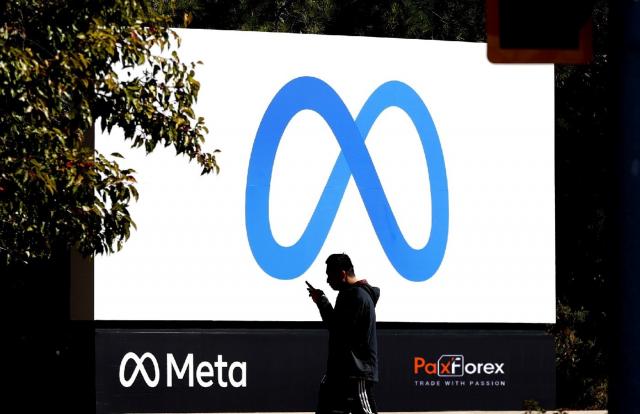
Source: PaxForex Premium Analytics Portal, Fundamental Insight
Investors who made an early move into Meta Platforms this year are reaping substantial rewards. As of the current moment, the stock has surged by an impressive 136% year-to-date. Encouragingly, two consecutive quarters of enhanced performance have sparked optimism among investors that the company may have weathered the worst of its challenges.
Yet, for those who missed out on the early opportunity, the question arises: Is it now the right time to reconsider and invest in Meta's stock? The company's advertising segment has traditionally been a lucrative cash cow, consistently generating expanding profits over the years. However, this trend hit a roadblock in 2022 when Meta reported a 1% decline in revenue and a significant 25% drop in operating profit.
These unfamiliar figures left investors taken aback, causing Meta's stock to plummet to a five-year low of $88. In response, Meta initiated aggressive measures, including substantial layoffs and a renewed focus on its core advertising business. Fortunately, there are promising indications that this business segment may have turned a corner.
For instance, in the first quarter of 2023, revenue rebounded with a 4% growth rate, marking a turnaround from the negative 4% in the fourth quarter of 2022. This positive trajectory continued into the second quarter of 2023, as Meta saw a robust 12% increase in advertising revenue and an 18% rise in operating profit. Furthermore, engagement metrics displayed improvement, with family daily active users (DAP) and Facebook daily active users (DAU) both registering growth of 7% and 5%, respectively.
Meta's notable turnaround suggests that the worst may be behind it, and the company appears to be back on track for growth. Additionally, Meta still has untapped potential to further monetize services like WhatsApp, Reels, and Messenger. Furthermore, it has room for enhancing its average revenue per user (ARPU) in regions beyond its primary markets, particularly in the Asia-Pacific region, where ARPU remains less than 10% of the US market.
In short, Meta appears to have promising growth opportunities on the horizon for the years to come.
Meta's current advertising business stands as a substantial revenue source, but the company is placing a significant bet on its Reality Labs division, centered around the metaverse, with hopes of it becoming a future revenue generator. This strategic gamble has led to a staggering $7.7 billion operating loss in the last six months alone, not accounting for previous investments, which makes the financial commitment even more substantial.
On one hand, Meta's substantial investment in the metaverse seems rational. The metaverse, envisioned as a vast interconnected digital universe, holds the potential to revolutionize various aspects of our lives, from work and social interactions to learning and entertainment. As this virtual realm continues to develop, it promises to unlock unprecedented opportunities, potentially culminating in a market worth $1 trillion or even more, according to early indications.
However, a significant challenge lies in the uncertainty surrounding the evolution of the metaverse and the key players that will shape its future. While Meta possesses a favorable starting position, boasting considerable resources, a massive user base of 3.9 billion monthly active users, a robust ecosystem, and advanced technology, there is no guarantee that it will dominate this emerging industry.
The concern arises from Meta's extensive financial commitment to this single venture, which could result in substantial shareholder value erosion if the metaverse project falls short of expectations. What exacerbates this situation is the limited influence of minority shareholders, given that founder and CEO Mark Zuckerberg retains a commanding 61% voting power.
In short, the metaverse represents a high-risk, high-reward proposition for Meta, where success is far from assured, making it a precarious investment venture.
A comprehensive stock investment decision necessitates an evaluation of the stock's valuation. Following its recent upswing, Meta's stock currently boasts a price-to-earnings (P/E) ratio of 34 times, surpassing its five-year average of 25 times. In comparison, Alphabet, a competitor in the tech industry, carries a P/E ratio of 29 times. In essence, potential investors should note that Meta's stock no longer offers an advantageous valuation, requiring them to be willing to pay a premium for ownership at present.
Meta's recent performance underscores the resilience and profitability of its advertising business, as it has successfully resumed its growth trajectory. Conversely, the metaverse venture remains a notably uncertain yet capital-intensive endeavor, which will draw resources away from the advertising business. Moreover, Meta's stock has shed its attractive valuation after experiencing a substantial rally in recent months.
In summary, while existing investors may not be compelled to hastily divest their Meta holdings, given the robust performance of the advertising division, they may opt to retain their positions for the time being. On the other hand, new investors might be wise to exercise caution and refrain from entering the market for Meta's stock at this juncture.
As long as the price is above 275.00, follow the recommendations below:
- Time frame: D1
- Recommendation: long position
- Entry point: 298.53
- Take Profit 1: 325.00
- Take Profit 2: 345.00
Alternative scenario:
If the level of 275.00 is broken-down, follow the recommendations below:
- Time frame: D1
- Recommendation: short position
- Entry point: 275.00
- Take Profit 1: 258.00
- Take Profit 2: 245.00













